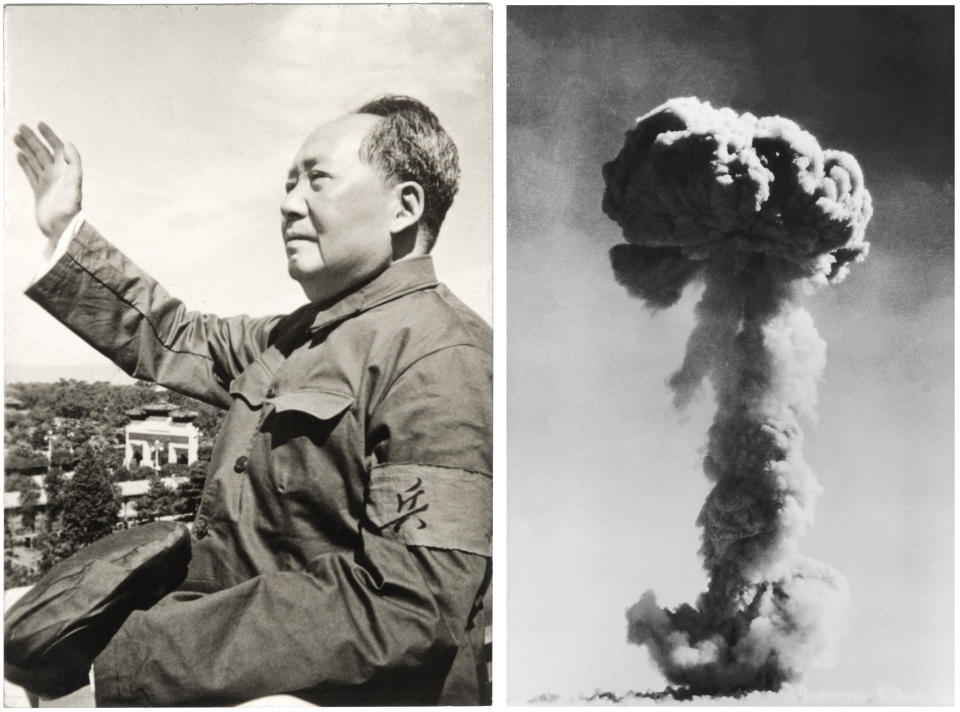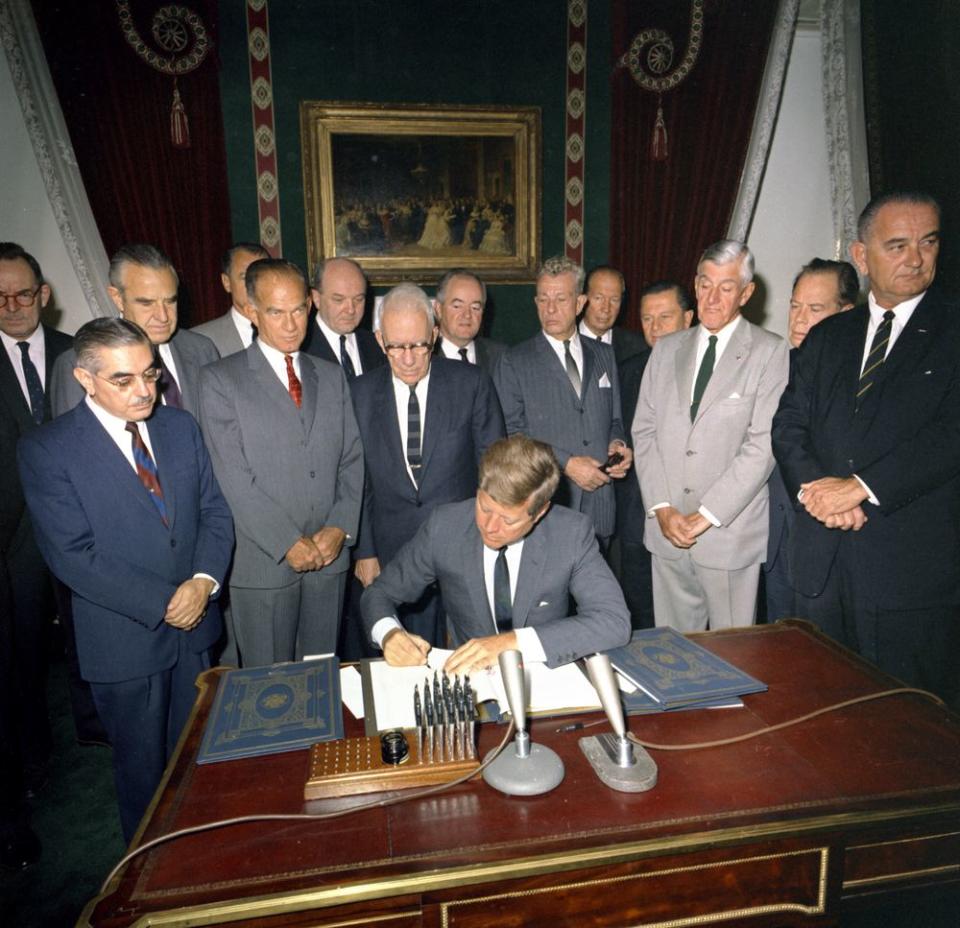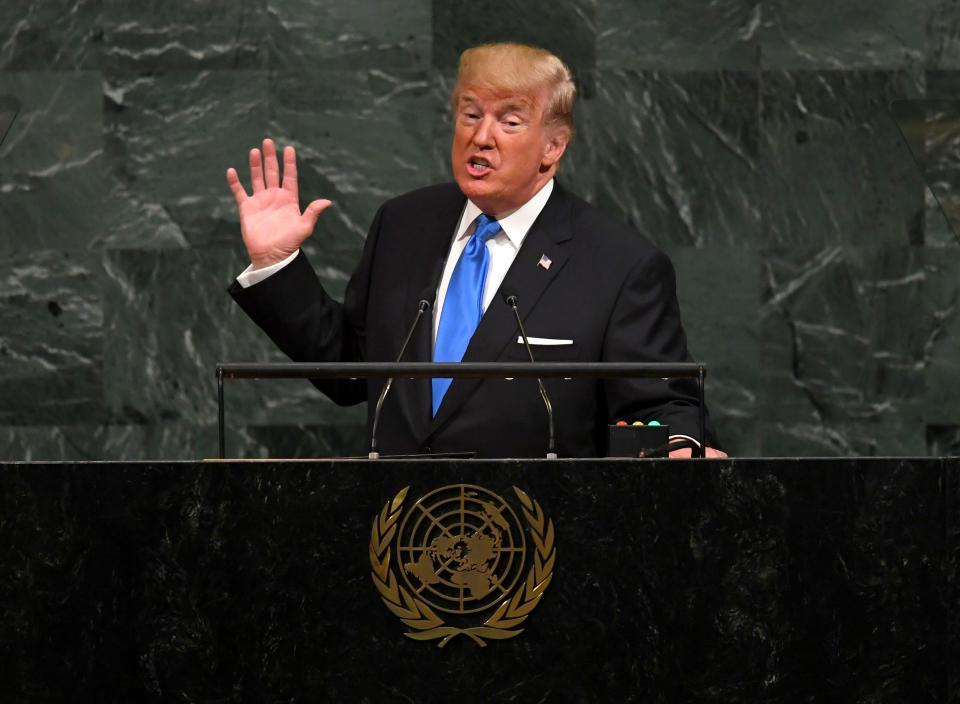Confronting a nuclear North Korea: Lessons from China
A Communist Asian nation successfully tests a nuclear device, stoking anxiety among U.S. intelligence officials who have been monitoring the sudden progress of the rogue nation’s nuclear weapons program. The U.S. president weighs preventive military strikes, the specter of war looms, and bellicose rhetoric spews from unpredictable leaders on both sides.
A scene-setter for current tensions with North Korea? Yes, but also a fair description of events in 1964, when the People’s Republic of China, ruled by Mao Zedong, conducted its first successful test of a nuclear bomb.
North Korea’s nuclear and long-range missile tests have already surpassed the Chinese test of 1964 (considered to be the moment China joined the nuclear club) and, according to 38North.org, initial calculations of its Nov. 29 test launch “indicate the new missile could deliver a moderately-sized nuclear weapon to any city on the U.S. mainland.”
That is a frightening prospect. But some foreign policy experts think it may also represent a step toward stability. They raise the possibility that a North Korea with a credible nuclear deterrence capability could be open to the kinds of implicit and explicit agreements that during and since the Cold War have kept the other nuclear-armed nations from plunging into the abyss of “mutually assured destruction.”

“If we’re optimistic, we could say this moment sets the scene for possible talks,” says Devin Stewart, senior program director at the Carnegie Council for Ethics in International Affairs.
The history of China’s nuclear program offers some lessons.
China was the rogue state of the 1960s, with an unpredictable and potentially irrational strongman at the helm. Mao was desperate to maintain the revolutionary fervor that brought him to power.
If Kim Jong Un and his father before him have been characterized and caricatured as unhinged mad men, consider what Mao said in 1957: “I’m not afraid of nuclear war. There are 2.7 billion people in the world; it doesn’t matter if some are killed. China has a population of 600 million; even if half of them are killed, there are still 300 million people left.”
Even as Mao dismissed nuclear weapons as inferior to his country’s conventional and “spiritual” defenses, China (with help from the Soviet Union) was pursuing its own nuclear arsenal. Declassified U.S. intelligence reports from the period warned that China’s “distorted view of the world may lead [China’s leadership] to miscalculate risks. This danger would be heightened if Communist China achieved a nuclear weapons capability.”
In his 1960 campaign, the future president John F. Kennedy said, “There are indications, because of new inventions, that 10, 15 or 20 nations will have a nuclear capacity, including Red China, by the end of the presidential office in 1964.”

Kennedy was right, at least about China. (More than a half-century later, nine countries are known to possess nuclear bombs.) It would be years before China had the technology to credibly launch a nuclear-tipped missile against the U.S., but Kennedy correctly predicted that by the end of 1964, a nuclear-armed China would be a top national security concern. State Department records released in 1998 show that Kennedy and the subsequent Johnson administration were so worried about China getting the bomb that they considered preventive strikes, including with nuclear weapons.
“That thinking dominated the ’60s, particularly in the Kennedy administration,” says Yevgen Sautin, a Gates Scholar at Cambridge University. “Kennedy had a huge fear of the Chinese nuclear program and sometimes used pretty racist language as well. … [He believed] that it was a unique peril for China to get the bomb.”
More than half a century later, President Trump warned in his first speech at the U.N. General Assembly that “the scourge of our planet is a group of rogue regimes,” and threatened to “totally destroy” North Korea if necessary. President Trump has frequently invoked the possibility of a preventive military strike against Pyongyang.

But many officials, including President Trump’s own former adviser Steve Bannon, have concluded “there’s no military solution” to North Korea.
That’s the same conclusion President Johnson ultimately reached. As Johnson weighed the risks and benefits of a nuclear strike, an influential report by the State Department put the risk of China’s acquisition of nuclear bombs in perspective. A member of the State Department’s Policy Planning Staff, Robert Johnson, sent a briefing memo to the president saying military action to prevent China from acquiring the bomb would be “undesirable” and that the chance that the Chinese would ever launch a first strike was “highly unlikely” given the relative strength of the military capabilities of the U.S.
Sautin suggests that the outcome in the case of China may offer lessons and maybe even reasons for optimism when it comes to North Korea. “We don’t know if this is what led to it, but around the same time China becomes a nuclear power, it becomes more interested in improving its relationship with the United States,” says Sautin. China was eventually accepted as a legitimate nuclear power and while major concerns remain about its proliferation controls, it has been a party to the nonproliferation treaty since the mid-1990s.
Could the world live with a nuclear North Korea? Will North Korea come to the negotiating table once it has achieved what it set out to achieve — a nuclear deterrent against the United States?

“I’m not going to go out and say North Korea is going to become a model international actor if they get nuclear weapons,” says Sautin. “I think their motivations are different, but [China] is another good example that, from a U.S. perspective, with enough time you can adjust your expectations.”
The two situations aren’t completely analogous.
It’s clear that Kim desires a “powerful deterrent” against what he calls the “protracted nuclear threats of the U.S. imperialists.” His language parrots Mao’s proclamations and justifications for China’s nuclear program.
But some analysts believe Kim Jong Un may not be “deterrable,” in the sense that he can be relied on to act rationally in his nation’s interests. More than half of North Korea’s nuclear and ballistic missile tests have occurred since he succeeded his father in 2011. His political purges and executions may have solidified his grip, but under his watch, North Korea has become even more isolated from the international community.
“That’s the big question mark,” says the Carnegie Council’s Devin Stewart. “If North Korea is so incredibly weak and unstable and it’s a cult of personality, it’s a dynasty that … worships this idea of self-reliance. Do they operate by the same rules of international relations?”
Evan Osnos has written extensively about the North Korea nuclear situation and the mythology surrounding the Kim dynasty and its culture of self-reliance, or juche. He recently interviewed a North Korean defector named Ri Jong Ho, who makes a different comparison. Osnos wrote in the New Yorker:
“North Korea is similar to a monarchy of the 16th and 17th centuries,” Ri told me. In that analogy, Kim is the nervous tyrant. “Although he is worshipped like a god, he does not think that he has stable control over the country. You can see, from his actions, that he is anxious. He’s quick-tempered,” Ri said. “He feels the need to show that he is a bold, daring leader who can make spontaneous decisions, that his power is strong. He is young and proud. He is like a car with no brakes. If his father were alive, he would be controlled, but his father is gone, and there is no one who can control him.”
Yevgen Sautin of Cambridge University points out another variable that makes the China analogy less than perfect — Donald Trump. There’s a psychological element, he says, that lies at the root of the U.S.-North Korea problem that is amplified by the temperament of the U.S. president.

There’s little evidence that President Trump is listening to the more moderate voices in his administration, and after the most recent ICBM test, his ambassador to the U.N., Nikki Haley, echoed her boss’s language, stating “[I]f war comes, make no mistake, the North Korean regime will be utterly destroyed.”
“It’s hard for us to accept a country that’s so blatantly aggressive with its rhetoric,” says Sautin. “It would be uniquely difficult for [President Trump] to accept that this country, with this stand-offish leader, can credibly threaten the United States.”
But experts agree on one thing: Increasingly, it can.
_____
Read more from Yahoo News:


